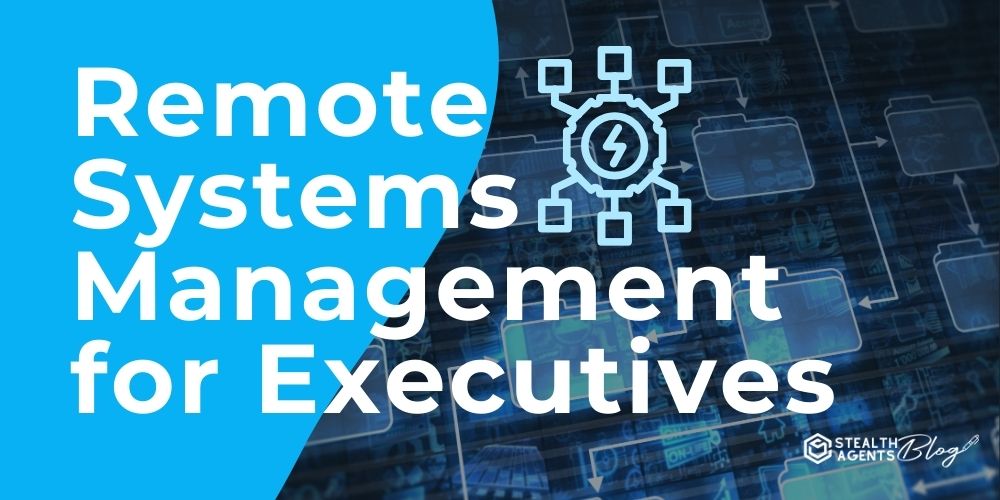Systems management executives are essential for streamlining operations, enhancing security, and ensuring scalable growth. Stealth Agents helps you access top-tier virtual systems management professionals who simplify complex processes, reduce costs, and keep your business running efficiently.
Systems management executives play a pivotal role in maintaining organizational efficiency.
Did you know that companies with effective systems management save up to 30% on operational costs annually?
This highlights the importance of strategic oversight in today’s competitive landscape.
As businesses grow, the need to hire a virtual assistant becomes essential, ensuring tasks are managed efficiently and resources are well utilized.
Virtual assistants provide a flexible solution to meet diverse business needs, and understanding virtual assistant pricing can help budget effectively.
Engaging a virtual assistant can increase productivity without the overhead of full-time staff.
For those looking to streamline their operations, Stealth Agents offers personalized support to find or hire virtual assistants.
Book a free discussion tailored to your preferences and virtual assistant pricing.
Why Hire Systems Management Executives For Your Team?
Hiring systems management executives for your team ensures your company’s operations run smoothly and efficiently.
These professionals bring expertise in managing and maintaining the complex systems crucial for your business’s day-to-day functionality.
With their ability to oversee everything from IT infrastructure to network security, systems management executives are pivotal in minimizing downtime and ensuring that all technical operations are reliable.
Their role also includes managing risk, essential for data security and compliance with industry regulations.
By having systems management executives on board, your team can focus on core business activities while they handle the technical complexities.
They serve as a bridge between technical capabilities and business goals, ensuring alignment and effectiveness.
Their presence can improve productivity and cost savings, making them a valuable asset to any organization.
Common Executive Management Roles
Executive management is typically composed of key leadership positions that drive a company’s strategy and day-to-day operations. Common roles include:
- Chief Executive Officer (CEO): Leads the company’s vision and overall direction.
- Chief Financial Officer (CFO): Manages financial planning, budgeting, and reporting.
- Chief Operating Officer (COO): Oversees internal operations and ensures organizational efficiency.
Depending on the organization’s size and structure, executive teams might also include titles such as Chief Information Officer (CIO), Chief Marketing Officer (CMO), or leaders responsible for specific regions or functions.
These executives work together to ensure alignment between a company’s objectives and its operational execution.
What are the Common Skills of Systems Management Executives?
1. Technical Proficiency
Systems management executives possess a strong foundation in technical skills, which is crucial for managing complex IT infrastructures.
They have extensive knowledge of operating systems, networking technologies, and software applications.
This expertise enables them to troubleshoot technical issues effectively, minimizing disruptions in business operations.
In addition, they are familiar with the latest technological advancements, allowing them to make informed decisions regarding system upgrades and implementations.
Their technical proficiency ensures that all systems run smoothly, supporting the organization’s goals.
These executives also understand the importance of cybersecurity and implement measures to protect sensitive data.
Systems management executives play a pivotal role in the company’s success by maintaining robust technical capabilities.
2. Leadership and Management
Leadership is vital for systems management executives, who often oversee IT teams and projects.
They are responsible for setting clear goals and ensuring team members align with the organization’s objectives.
Effective communication is vital; these executives must convey complex technical concepts to non-technical stakeholders.
They also create an environment where team members feel supported and motivated, fostering collaboration and innovation.
Decision-making is another critical aspect of their role, requiring them to balance technical requirements with business needs.
Systems management executives are adept at crisis management, staying calm under pressure, and guiding challenging situations.
Their leadership skills ensure that projects are delivered on time and within budget, contributing to the company’s growth.
3. Problem-Solving Abilities
Systems management executives are known for their exceptional problem-solving skills.
They approach challenges methodically, analyzing issues from multiple angles to identify the root cause.
Once a problem is understood, they develop practical solutions that prevent recurrence.
Their ability to anticipate potential problems and implement preventative measures is invaluable.
These executives remain composed in high-pressure situations, drawing on their experience to resolve issues efficiently.
They also encourage a culture of continuous improvement, where team members are empowered to identify and address problems proactively.
By fostering a proactive approach to problem-solving, systems management executives help maintain a stable and reliable IT environment.
4. Strategic Planning
Strategic planning is a core competency for systems management executives aligning IT initiatives with business objectives.
They assess current systems and identify opportunities for improvement, ensuring that technology supports organizational goals.
These executives are skilled in forecasting future IT needs, considering factors such as growth, budget, and emerging technologies.
They develop comprehensive plans that outline the steps necessary to achieve these goals, gaining stakeholders’ buy-in.
By carefully managing resources and timelines, they ensure that projects are delivered successfully.
Systems management executives also evaluate the impact of IT investments, providing insights into their contribution to business performance.
Their strategic approach helps the company stay competitive in a rapidly changing technological landscape.
5. Communication Skills
Effective communication is essential for systems management executives, who must bridge the gap between technical teams and business stakeholders.
They excel at translating complex technical information into clear, understandable language.
This ability ensures that all parties have a shared understanding of IT projects and their implications.
These executives facilitate open dialogue, encouraging feedback and collaboration among team members and departments.
They are also skilled negotiators who manage expectations and resolve conflicts diplomatically.
In addition, they provide regular updates on IT initiatives, keeping stakeholders informed of progress and challenges.
By fostering transparent communication, systems management executives build trust and credibility within the organization, supporting the successful execution of IT strategies.
How Do Systems Management Executives Impact Company Efficiency?
Systems management executives are critical in enhancing company efficiency by overseeing the technical operations that keep everything running smoothly.
They manage the IT infrastructure, ensuring that all systems are working correctly and that any issues are promptly addressed, minimizing downtime.
Their focus on maintaining reliable networks and systems allows other departments to focus on their core tasks without technical interruptions.
By implementing effective data management practices, systems management executives ensure that information flows seamlessly across the company.
This coordination helps make informed decisions quickly, saving time and resources.
Their risk management and compliance expertise ensures the company adheres to regulations, avoiding costly penalties.
Overall, the presence of systems management executives contributes significantly to a company’s ability to operate efficiently and effectively.
What are the Benefits of Hiring Systems Management Executives for the Business?
-
Improved Operational Efficiency
Systems management executives are vital in ensuring a company’s operations run smoothly.
They oversee IT infrastructure, ensuring that systems are maintained and updated regularly to prevent disruptions.
Identifying and resolving potential issues before they escalate helps minimize downtime and maintain productivity.
Their knowledge of best practices in system management allows them to implement processes that speed up workflows across departments.
This results in more efficient operations, as employees can rely on stable systems to support their daily tasks.
Additionally, systems management executives ensure that technology resources are used optimally, reducing waste and improving output.
Overall, their role significantly contributes to a seamless operational environment.
-
Enhanced Data Security
Data security is a top priority for any business, and systems management executives play a crucial role in safeguarding company information.
In the realm of data security in business, they implement security measures such as firewalls, encryption, and access controls to protect sensitive data.
They maintain a secure IT environment by regularly assessing vulnerabilities and addressing potential threats.
Their expertise in risk management ensures that the company complies with data protection regulations, avoiding legal repercussions.
Systems management executives also educate employees on best data security practices, fostering a culture of vigilance.
With the support of Philippines cybersecurity services, they respond swiftly to mitigate damage and restore system integrity in the event of a security breach.
Their vigilance helps protect the company from data loss and cyber threats.
-
Cost Savings
Hiring systems management executives can lead to significant cost savings for businesses.
They efficiently manage IT budgets, ensuring that resources are allocated where needed, much like a Filipino virtual assistant might handle administrative tasks.
By implementing cost-effective solutions and negotiating with vendors, they reduce unnecessary expenditures.
Regular maintenance and timely upgrades prevent costly system failures and extend the lifespan of IT assets.
Their ability to streamline processes enhances productivity, which translates into financial savings, similar to the benefits when you hire Filipino virtual assistants for support tasks.
Minimizing downtime and maximizing resource utilization also contribute to a more profitable operation.
Their strategic approach to managing IT resources helps businesses maintain a healthy bottom line.
-
Better Decision Making
Systems management executives provide valuable insights that support informed decision-making within the organization.
Ensuring data is accurate, accessible, and well-organized helps executives and managers make well-informed choices.
Their ability to analyze system performance and generate reports aids in identifying trends and opportunities.
This data-driven approach helps align IT initiatives with business goals, ensuring that technology investments yield positive returns.
They also play a crucial role in evaluating and selecting new technologies to enhance business capabilities.
Systems management executives support strategic planning by providing a clear picture of the IT landscape.
Their contribution helps the company stay competitive in a fast-paced market.
-
Increased Innovation
Systems management executives facilitate innovation by providing the technological foundation for new initiatives.
They ensure that the IT infrastructure can support emerging technologies and innovative projects.
Maintaining flexible systems allows the company to adapt quickly to changing market demands and technological advancements.
Systems management executives foster collaboration between IT and other departments, encouraging creative problem-solving.
Implementing tools and systems that enhance communication creates an environment conducive to innovation.
Systems management executives also support research and development efforts by providing technology resources.
Their support is crucial for fostering a culture of innovation within the organization.
-
Strengthened Customer Relations
Customer satisfaction is directly linked to the reliability and efficiency of a company’s systems and systems management executives ensure that these systems function optimally.
By maintaining stable and responsive IT systems, they enhance the customer experience.
Supported by robust technology, quick and efficient service delivery leads to higher customer satisfaction.
Systems management executives also implement customer relationship management (CRM) systems that help track customer interactions and preferences, echoing customer relations tips from successful business owners.
This enables personalized service and improved communication, fostering stronger relationships with clients.
Their work ensures that customer data is secure, building trust and loyalty.
By supporting seamless customer interactions, they contribute to long-term business success.
-
Support for Business Growth
As a company grows, so does the complexity of its IT needs, and systems management executives are instrumental in managing this growth.
They plan and implement scalable IT solutions that support expansion efforts.
By ensuring that systems are flexible and capable of handling increased loads, they facilitate smooth transitions during growth phases.
Understanding emerging technologies allows them to recommend solutions that open new business opportunities.
Systems management executives also help integrate new acquisitions or branches into the existing IT framework.
Their strategic planning ensures that the IT infrastructure can support the company’s long-term objectives.
Their role is essential in ensuring that growth is sustainable and efficient.
Takeaways
Systems management executives are essential for ensuring that a company’s IT infrastructure is reliable and efficient, directly impacting business success and customer satisfaction.
Their expertise maintains smooth operations and integrates with roles such as virtual assistant to enhance productivity and support.
If you want to improve your company’s IT management and support systems, consider contacting Stealth Agents.
They offer personalized services and support tailored to your business needs, including virtual assistant capabilities.
You can call and book a free discussion with them to explore your preferences and pricing options, ensuring that your systems management aligns perfectly with your business goals.
Want to save time and money? Let Stealth Agents help you hire a virtual assistant to improve your business operations. Get started today
Frequently Asked Questions
What does a systems management executive do in a remote work environment?
In a remote work setup, systems management executives make sure the IT systems work well for virtual teams. They manage tools for remote access, keep communication secure, and set up cloud-based platforms to help teams work together smoothly and safely.
How do systems management executives help with cybersecurity?
They protect company data by using tools like firewalls, encryption, and systems that detect threats. They also check for security problems regularly, control who can access information, and make sure the company follows data protection rules.
Why is planning important for systems management executives?
Planning helps systems management executives make sure IT systems match the company’s goals. By looking at what the company needs now and in the future, they create plans to improve technology and support the company’s growth.
How do systems management executives improve communication in a company?
They set up and manage tools like video calls, messaging apps, and project management software. These tools help teams talk and work together easily, even if they are in different locations.
What challenges do systems management executives face when aligning IT with business goals?
They deal with challenges like keeping up with new technology, working within budgets, and training staff. They need to make sure IT systems support the company’s goals without spending too much money.
How do systems management executives help businesses grow?
They create IT systems that can handle more work as the business grows. They look for new technologies and set up systems that allow the company to expand without slowing down or breaking.
What tools do systems management executives use to manage data?
They use tools like databases, data analysis platforms, and cloud storage. These tools help organize, store, and analyze data securely, making it easy to find and use information when needed.
How do systems management executives ensure the company follows rules?
They stay updated on industry rules and set up policies to follow them. They check systems regularly, train staff on the rules, and use software to track changes in regulations, reducing the risk of breaking any laws.
What do systems management executives do for disaster recovery?
They create plans to keep the business running during emergencies. This includes setting up backup systems, testing recovery plans, and making sure the company can quickly get back to work after a problem.
How do systems management executives improve customer experience with IT?
They use tools like CRM systems, make websites run better, and ensure communication channels work well. These tools help provide quick responses, secure transactions, and personalized service, making customers happy and loyal.









